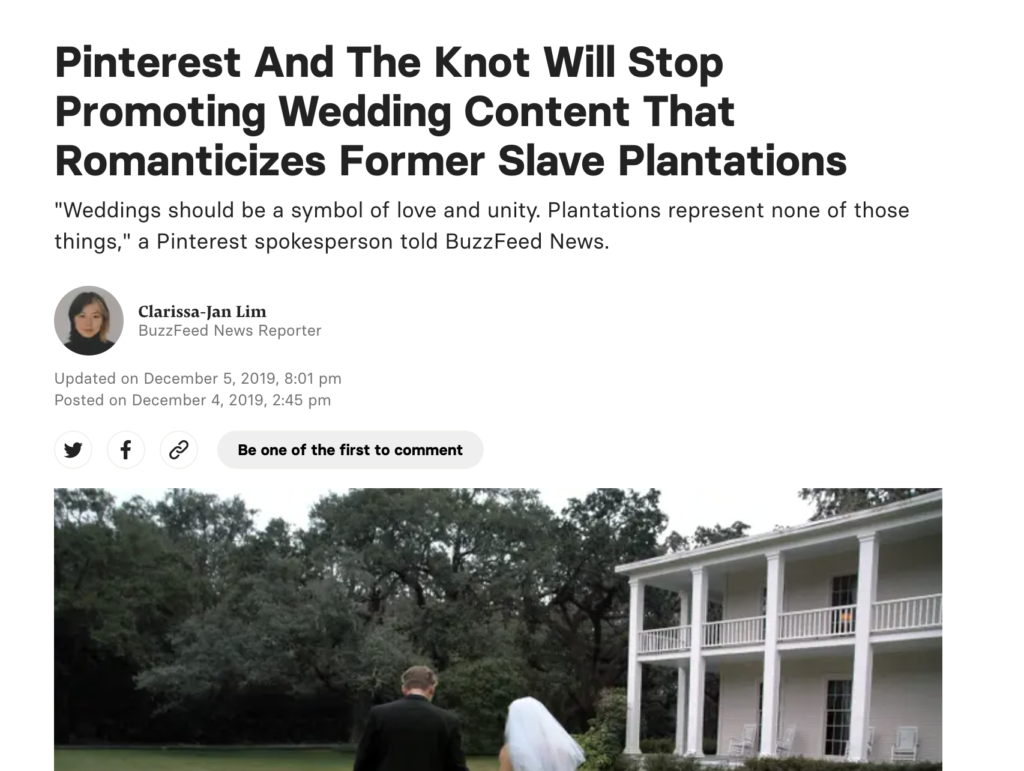“I Was Supposed To Provide Pros For Promoting Slave Plantations”: Black And Brown Tech Workers Speak Out

Public protests demanding justice for Black people killed by police have brought a reckoning to the business world, with executives forced to resign, companies overhauling internal policies, and employees quitting in protest.
For the tech industry, this reckoning has been going on in some form since 2014. The industry, which prides itself on agility, had previously failed to move the needle on workplace diversity and take complaints seriously. While there’s been an improvement over the years, some may argue it’s still failing to take robust action.
In October 2019, Pinterest, a giant in the sector, came under immense pressure from the civil rights activist group Color of Change to stop promoting and romanticizing former slave plantations as wedding venues.
The group found an ally in Ifeoma Ozoma, a Black woman who at the time was working as the company’s public policy and social impact manager.
“I agree with them on this — completely,” Ozoma wrote in an email seen by the LA times notifying her team about the letter from Color of Change.
The company’s decision two months later to limit the reach of plantation wedding content received considerable press coverage.
In a public statement, a company spokesperson thanked Color of Change for bringing attention to “this disrespectful practice.” But privately, Ozoma was reportedly chastised.
Ozoma reported that in one of her performance reviews, her manager said she should have listed multiple options with pros and cons for each. Her manager accused her of “channeling” the company to her preferred outcome.
“I was supposed to, as a Black woman, provide pros for promoting slave plantations,” she said. “They’re racist policies and they haven’t changed them.”

Ozoma told her story to The Los Angeles Times as part of a study they are working on.
Of the 68 tech workers who responded to the survey created by The Times, half said they felt tech was not inclusive to people from diverse backgrounds.
“Tech is inclusive because they need our talent and manpower regardless of whether they acknowledge it or not,” said one Hulu employee who asked not to be named. “It’s a spectrum of tolerance and acceptance.”
“When your position is this tenuous, you rarely leave since the next job is never sure to be there,” said one woman who works at an education-tech startup and asked to be anonymous.
These experiences mirror the results of a Pew Research study from early 2018, which found that more than 60% of Black people in STEM fields said they had experienced discrimination at work, as had 50% of women, 44% of Asian STEM workers, and 42% of Latinx people.
Pew also found that discrimination typically took one of eight forms: being denied a promotion, being turned down for a job, being passed over for important assignments, experiencing repeated slights at work (or microaggressions), receiving less support from above than co-workers, getting paid less than co-workers doing the same job, feeling isolated, and being treated as less than competent.
On June 17, Google Chief Executive Sundar Pichai said the company would put an end to a long-standing practice of directing employees to police their own colleagues and seek out “unauthorized visitors” by checking their badges. “We have realized this process is susceptible to bias,” Pichai wrote in the announcement.
For Leslie Miley, a former engineering director at Google and a Black man who had twice been physically stopped by co-workers when entering company offices, the move was a long time coming.
“I don’t want a hundred-million-dollar commitment,” he said. “I don’t want a dollar figure attached to me. I want sustained investment in a community that you have ignored and I would like companies to admit they have ignored these communities,” he told the Times referring to the tech industries’ commitments.



